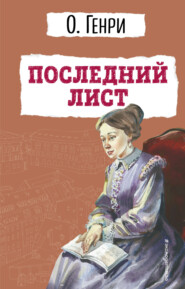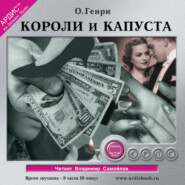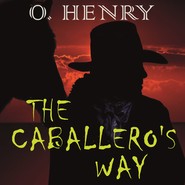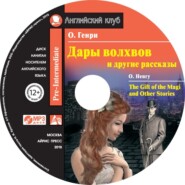По всем вопросам обращайтесь на: info@litportal.ru
(©) 2003-2024.
✖
Sixes and Sevens
Настройки чтения
Размер шрифта
Высота строк
Поля
"I was speaking of hotels," said the New Yorker. "We lead Europe in that respect. And as far as our leisure class is concerned we are far – "
"Oh, I don't know," interrupted the man from Topaz City. "There were twelve tramps in our jail when I left home. I guess New York isn't so – "
"Beg pardon, you seem to misapprehend the idea. Of course, you visited the Stock Exchange and Wall Street, where the – "
"Oh, yes," said the man from Topaz City, as he lighted a Pennsylvania stogie, "and I want to tell you that we've got the finest town marshal west of the Rockies. Bill Rainer he took in five pickpockets out of the crowd when Red Nose Thompson laid the cornerstone of his new saloon. Topaz City don't allow – "
"Have another Rhine wine and seltzer," suggested the New Yorker. "I've never been West, as I said; but there can't be any place out there to compare with New York. As to the claims of Chicago I – "
"One man," said the Topazite – "one man only has been murdered and robbed in Topaz City in the last three – "
"Oh, I know what Chicago is," interposed the New Yorker. "Have you been up Fifth Avenue to see the magnificent residences of our mil – "
"Seen 'em all. You ought to know Reub Stegall, the assessor of Topaz. When old man Tilbury, that owns the only two-story house in town, tried to swear his taxes from $6,000 down to $450.75, Reub buckled on his forty-five and went down to see – "
"Yes, yes, but speaking of our great city – one of its greatest features is our superb police department. There is no body of men in the world that can equal it for – "
"That waiter gets around like a Langley flying machine," remarked the man from Topaz City, thirstily. "We've got men in our town, too, worth $400,000. There's old Bill Withers and Colonel Metcalf and – "
"Have you seen Broadway at night?" asked the New Yorker, courteously. "There are few streets in the world that can compare with it. When the electrics are shining and the pavements are alive with two hurrying streams of elegantly clothed men and beautiful women attired in the costliest costumes that wind in and out in a close maze of expensively – "
"Never knew but one case in Topaz City," said the man from the West. "Jim Bailey, our mayor, had his watch and chain and $235 in cash taken from his pocket while – "
"That's another matter," said the New Yorker. "While you are in our city you should avail yourself of every opportunity to see its wonders. Our rapid transit system – "
"If you was out in Topaz," broke in the man from there, "I could show you a whole cemetery full of people that got killed accidentally. Talking about mangling folks up! why, when Berry Rogers turned loose that old double-barrelled shot-gun of his loaded with slugs at anybody – "
"Here, waiter!" called the New Yorker. "Two more of the same. It is acknowledged by every one that our city is the centre of art, and literature, and learning. Take, for instance, our after-dinner speakers. Where else in the country would you find such wit and eloquence as emanate from Depew and Ford, and – "
"If you take the papers," interrupted the Westerner, "you must have read of Pete Webster's daughter. The Websters live two blocks north of the court-house in Topaz City. Miss Tillie Webster, she slept forty days and nights without waking up. The doctors said that – "
"Pass the matches, please," said the New Yorker. "Have you observed the expedition with which new buildings are being run up in New York? Improved inventions in steel framework and – "
"I noticed," said the Nevadian, "that the statistics of Topaz City showed only one carpenter crushed by falling timbers last year and he was caught in a cyclone."
"They abuse our sky line," continued the New Yorker, "and it is likely that we are not yet artistic in the construction of our buildings. But I can safely assert that we lead in pictorial and decorative art. In some of our houses can be found masterpieces in the way of paintings and sculpture. One who has the entree to our best galleries will find – "
"Back up," exclaimed the man from Topaz City. "There was a game last month in our town in which $90,000 changed hands on a pair of – "
"Ta-romt-tara!" went the orchestra. The stage curtain, blushing pink at the name "Asbestos" inscribed upon it, came down with a slow midsummer movement. The audience trickled leisurely down the elevator and stairs.
On the sidewalk below, the New Yorker and the man from Topaz City shook hands with alcoholic gravity. The elevated crashed raucously, surface cars hummed and clanged, cabmen swore, newsboys shrieked, wheels clattered ear-piercingly. The New Yorker conceived a happy thought, with which he aspired to clinch the pre-eminence of his city.
"You must admit," said he, "that in the way of noise New York is far ahead of any other – "
"Back to the everglades!" said the man from Topaz City. "In 1900, when Sousa's band and the repeating candidate were in our town you couldn't – "
The rattle of an express wagon drowned the rest of the words.
V
HOLDING UP A TRAIN
Note. The man who told me these things was for several years an outlaw in the Southwest and a follower of the pursuit he so frankly describes. His description of the modus operandi should prove interesting, his counsel of value to the potential passenger in some future "hold-up," while his estimate of the pleasures of train robbing will hardly induce any one to adopt it as a profession. I give the story in almost exactly his own words.
O. H.
Most people would say, if their opinion was asked for, that holding up a train would be a hard job. Well, it isn't; it's easy. I have contributed some to the uneasiness of railroads and the insomnia of express companies, and the most trouble I ever had about a hold-up was in being swindled by unscrupulous people while spending the money I got. The danger wasn't anything to speak of, and we didn't mind the trouble.
One man has come pretty near robbing a train by himself; two have succeeded a few times; three can do it if they are hustlers, but five is about the right number. The time to do it and the place depend upon several things.
The first "stick-up" I was ever in happened in 1890. Maybe the way I got into it will explain how most train robbers start in the business. Five out of six Western outlaws are just cowboys out of a job and gone wrong. The sixth is a tough from the East who dresses up like a bad man and plays some low-down trick that gives the boys a bad name. Wire fences and "nesters" made five of them; a bad heart made the sixth.
Jim S– and I were working on the 101 Ranch in Colorado. The nesters had the cowman on the go. They had taken up the land and elected officers who were hard to get along with. Jim and I rode into La Junta one day, going south from a round-up. We were having a little fun without malice toward anybody when a farmer administration cut in and tried to harvest us. Jim shot a deputy marshal, and I kind of corroborated his side of the argument. We skirmished up and down the main street, the boomers having bad luck all the time. After a while we leaned forward and shoved for the ranch down on the Ceriso. We were riding a couple of horses that couldn't fly, but they could catch birds.
A few days after that, a gang of the La Junta boomers came to the ranch and wanted us to go back with them. Naturally, we declined. We had the house on them, and before we were done refusing, that old 'dobe was plumb full of lead. When dark came we fagged 'em a batch of bullets and shoved out the back door for the rocks. They sure smoked us as we went. We had to drift, which we did, and rounded up down in Oklahoma.
Well, there wasn't anything we could get there, and, being mighty hard up, we decided to transact a little business with the railroads. Jim and I joined forces with Tom and Ike Moore – two brothers who had plenty of sand they were willing to convert into dust. I can call their names, for both of them are dead. Tom was shot while robbing a bank in Arkansas; Ike was killed during the more dangerous pastime of attending a dance in the Creek Nation.
We selected a place on the Santa Fé where there was a bridge across a deep creek surrounded by heavy timber. All passenger trains took water at the tank close to one end of the bridge. It was a quiet place, the nearest house being five miles away. The day before it happened, we rested our horses and "made medicine" as to how we should get about it. Our plans were not at all elaborate, as none of us had ever engaged in a hold-up before.
The Santa Fé flyer was due at the tank at 11.15 p. m. At eleven, Tom and I lay down on one side of the track, and Jim and Ike took the other. As the train rolled up, the headlight flashing far down the track and the steam hissing from the engine, I turned weak all over. I would have worked a whole year on the ranch for nothing to have been out of that affair right then. Some of the nerviest men in the business have told me that they felt the same way the first time.
The engine had hardly stopped when I jumped on the running-board on one side, while Jim mounted the other. As soon as the engineer and fireman saw our guns they threw up their hands without being told, and begged us not to shoot, saying they would do anything we wanted them to.
"Hit the ground," I ordered, and they both jumped off. We drove them before us down the side of the train. While this was happening, Tom and Ike had been blazing away, one on each side of the train, yelling like Apaches, so as to keep the passengers herded in the cars. Some fellow stuck a little twenty-two calibre out one of the coach windows and fired it straight up in the air. I let drive and smashed the glass just over his head. That settled everything like resistance from that direction.
By this time all my nervousness was gone. I felt a kind of pleasant excitement as if I were at a dance or a frolic of some sort. The lights were all out in the coaches, and, as Tom and Ike gradually quit firing and yelling, it got to be almost as still as a graveyard. I remember hearing a little bird chirping in a bush at the side of the track, as if it were complaining at being waked up.
I made the fireman get a lantern, and then I went to the express car and yelled to the messenger to open up or get perforated. He slid the door back and stood in it with his hands up. "Jump overboard, son," I said, and he hit the dirt like a lump of lead. There were two safes in the car – a big one and a little one. By the way, I first located the messenger's arsenal – a double-barrelled shot-gun with buckshot cartridges and a thirty-eight in a drawer. I drew the cartridges from the shot-gun, pocketed the pistol, and called the messenger inside. I shoved my gun against his nose and put him to work. He couldn't open the big safe, but he did the little one. There was only nine hundred dollars in it. That was mighty small winnings for our trouble, so we decided to go through the passengers. We took our prisoners to the smoking-car, and from there sent the engineer through the train to light up the coaches. Beginning with the first one, we placed a man at each door and ordered the passengers to stand between the seats with their hands up.
If you want to find out what cowards the majority of men are, all you have to do is rob a passenger train. I don't mean because they don't resist – I'll tell you later on why they can't do that – but it makes a man feel sorry for them the way they lose their heads. Big, burly drummers and farmers and ex-soldiers and high-collared dudes and sports that, a few moments before, were filling the car with noise and bragging, get so scared that their ears flop.
There were very few people in the day coaches at that time of night, so we made a slim haul until we got to the sleeper. The Pullman conductor met me at one door while Jim was going round to the other one. He very politely informed me that I could not go into that car, as it did not belong to the railroad company, and, besides, the passengers had already been greatly disturbed by the shouting and firing. Never in all my life have I met with a finer instance of official dignity and reliance upon the power of Mr. Pullman's great name. I jabbed my six-shooter so hard against Mr. Conductor's front that I afterward found one of his vest buttons so firmly wedged in the end of the barrel that I had to shoot it out. He just shut up like a weak-springed knife and rolled down the car steps.
I opened the door of the sleeper and stepped inside. A big, fat old man came wabbling up to me, puffing and blowing. He had one coat-sleeve on and was trying to put his vest on over that. I don't know who he thought I was.
"Young man, young man," says he, "you must keep cool and not get excited. Above everything, keep cool."
"I can't," says I. "Excitement's just eating me up." And then I let out a yell and turned loose my forty-five through the skylight.
That old man tried to dive into one of the lower berths, but a screech came out of it and a bare foot that took him in the bread-basket and landed him on the floor. I saw Jim coming in the other door, and I hollered for everybody to climb out and line up.
They commenced to scramble down, and for a while we had a three-ringed circus. The men looked as frightened and tame as a lot of rabbits in a deep snow. They had on, on an average, about a quarter of a suit of clothes and one shoe apiece. One chap was sitting on the floor of the aisle, looking as if he were working a hard sum in arithmetic. He was trying, very solemn, to pull a lady's number two shoe on his number nine foot.
The ladies didn't stop to dress. They were so curious to see a real, live train robber, bless 'em, that they just wrapped blankets and sheets around themselves and came out, squeaky and fidgety looking. They always show more curiosity and sand than the men do.
We got them all lined up and pretty quiet, and I went through the bunch. I found very little on them – I mean in the way of valuables. One man in the line was a sight. He was one of those big, overgrown, solemn snoozers that sit on the platform at lectures and look wise. Before crawling out he had managed to put on his long, frock-tailed coat and his high silk hat. The rest of him was nothing but pajamas and bunions. When I dug into that Prince Albert, I expected to drag out at least a block of gold mine stock or an armful of Government bonds, but all I found was a little boy's French harp about four inches long. What it was there for, I don't know. I felt a little mad because he had fooled me so. I stuck the harp up against his mouth.

















